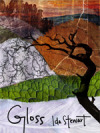Gloss
Musical and deeply rooted in a sense of place, Ida Stewart’s debut poetry collection highlights the essential element of sound within contemporary poetry. In a series of free verse poems that engage with the lyric quality of traditional nature poetry, Stewart delves beyond a simple examination of nature; instead, nature ties into a sense of past and place, ever-present in the depths of memory. Set within the concrete of ground, the minuteness of soil, Gloss condenses language to its potential as rich medium for the human voice and soul.
Musical and deeply rooted in a sense of place, Ida Stewart’s debut poetry collection highlights the essential element of sound within contemporary poetry. In a series of free verse poems that engage with the lyric quality of traditional nature poetry, Stewart delves beyond a simple examination of nature; instead, nature ties into a sense of past and place, ever-present in the depths of memory. Set within the concrete of ground, the minuteness of soil, Gloss condenses language to its potential as rich medium for the human voice and soul.
Small yet powerful lyrics comprise much of the collection, filled with images of the landscape. In “Soil,” the speaker notes: “in your mouth sounds like soul— / like the world’s been oiled, all the old / consolidated.” This repetition of sound creates an echoing effect, one phrase after the other, allowing images to overlap and build upon one another.
The collection’s title poem further addresses this excess of sound. A speaker turns a repeated phrase in three six-line stanzas, as she attempts to explain the meaning of “Gloss.” Evoking images of the mountains and actions of their inhabitants, the speaker claims:
They clamber from the mouth—
men untrapped like tumbling hallelujahs from the gut,
the dark nonsense of the mountain.
This, and the laying on of hands, wives
finding their silhouettes in the superficial better light,
putting worlds back together.
In the continual struggle of these people, they remain within the mountain-scape despite their spiritual ecstasy. This mixture of abstractions paired with specific instances lends a kind of balancing effect for the poem, allowing it to expand and retract.
Along with the skill on the smaller scale of individual poems, the collection contains a series of poems titled “Glossary,” each addressing words with the same prefixes or endings. In “Glossary: Ex- Words,” the speaker attempts to define “ex-a-mine,” saying “Is torn between filling in and tearing some more. / (And, what to tear apart? People tearing up, torn limb from limb / from branch, the family limping along in these parts?” The constant questioning, recursive nature of these poems allows for a closer look at the process of poetics and memory, how to construct a meaningful image from the past.
Relations between human bodies develop throughout the collection, as the speaker reflects on past conflict. In “What Gives,” the speaker proclaims: “No, no rewrites, / no repasts: no way to ride Midnight / back to afternoon.” The final tone of this ended relationship shows the constant moving forward of the speaker, even as she continues to look back.
Caught up in the memory of place, Gloss enlivens language through rethinking words, recapitulating them into specifics, concrete images of the speaker’s world, continuing to live.





